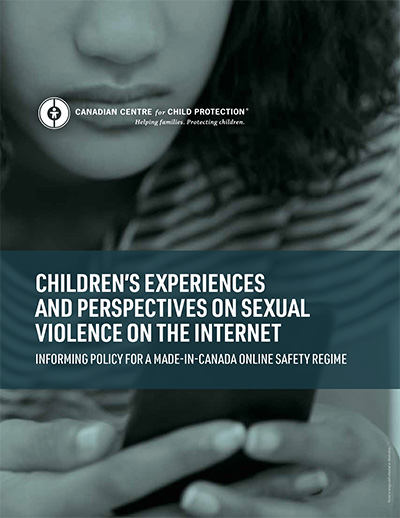Teen victims overwhelmingly support strong laws and safety-by-design measures to protect children online, emphasizing that voluntary industry action has proven insufficient.
Children’s experiences and perspectives on sexual violence on the internet: Informing policy for a made-in-Canada online safety regime
In Canada, children are being sexually victimized online at an alarming rate.
This report presents the perspectives of nearly 1,300 teens in Canada who have been sexually victimized online. Through survey responses, they shared valuable insights including the apps and platforms where they’ve been victimized, how platforms responded to their reports, and reasons why they haven’t reported harms to platforms. The teen victims also weighed in on whether Canada should have online safety regulation and the perceived effectiveness of several policy measures.
Online sexual violence against children is not an inevitable part of our increasingly digital lives. Through well-designed policies, the Canadian government can ensure online services and the broader technology industry are obligated to safeguard online users and prevent harms from occurring in the first place.
Read the Report
Key findings and recommendations include:
-
Nearly 9 in 10 teen victims (86%) were harmed in private messaging environments.
- Recommendation: Ensure online safety regimes impose appropriate duties of care and obligations onto private communication services and functions.
-
Harm occurred on many popular apps and platforms, with 2 in 5 teen victims (39%) sexually victimized on Snapchat®.
- Recommendation: Online safety regimes must scope in and apply to a broad range of platforms, with graduated obligations based on a given service’s anticipated or known risk factors.
-
Over 1 in 2 teen victims (52%) had been sent an unwanted nude or sexual image, and 1 in 6 (17%) had someone make a “fake” nude or sexual image of them.
- Recommendation: Amend the Criminal Code to address the creation and sharing of nude and sexual deepfakes, and consider whether existing Criminal Code offences adequately address cyberflashing.
-
Over 9 in 10 teen victims (93%) think Canada should legally force apps and platforms to prevent harm online. Most also thought safety measures would help.
- Recommendation: Canada should introduce an online safety regime that requires apps and platforms be designed with safety in mind and provide children with enhanced protections.
About this survey:
C3P developed a questionnaire and commissioned Léger, a market research and polling firm, to conduct an anonymous online survey. The survey was available in English and French. The 1,279 survey participants met the following criteria:
- Were 13 to 17 (inclusive) years of age at the time of the survey;
- Lived in Canada;
- Experienced at least one form of online sexual victimization.
To ensure nationally representative results, the data was weighted on age, gender, and province based on demographics from the 2021 Canadian census.
